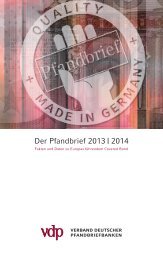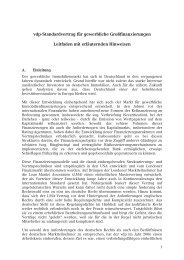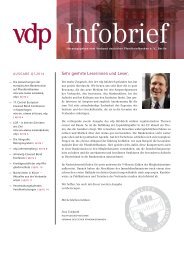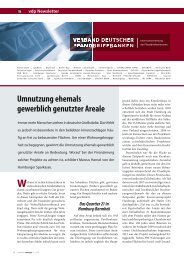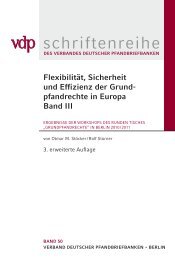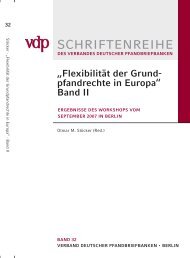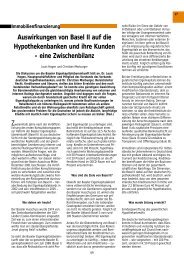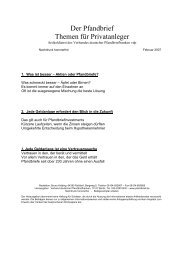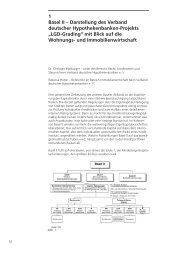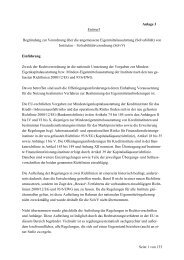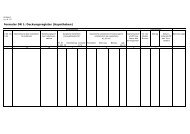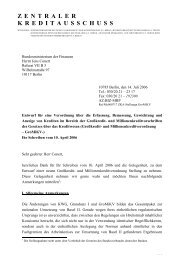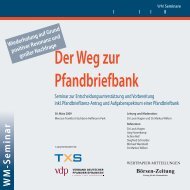The Pfandbrief 2011 | 2012
The Pfandbrief 2011 | 2012
The Pfandbrief 2011 | 2012
Create successful ePaper yourself
Turn your PDF publications into a flip-book with our unique Google optimized e-Paper software.
<strong>The</strong> German Property Market – Guaranteeing the Sustained Value of Mortgage <strong>Pfandbrief</strong>e<br />
Change in RevPAR: 2010 against 2009<br />
%<br />
30<br />
20<br />
2010<br />
2009<br />
10<br />
0<br />
-10<br />
-20<br />
-30<br />
Berlin<br />
Düsseldorf<br />
Frankfurt<br />
Hamburg<br />
Cologne<br />
Leipzig<br />
Munich<br />
Stuttgart<br />
Sources: Eurohypo RAC Research, German Hotel Association (IHA)<br />
72<br />
<strong>The</strong> transaction volume is expected to rise further during the course of <strong>2011</strong> to close to precrisis<br />
levels. <strong>The</strong> positive trend in the number of visitors and room occupancy figures is likewise<br />
expected to continue, meaning an increase in room occupancy and revenue per available<br />
room.<br />
Logistics<br />
<strong>The</strong> logistics sector was badly hit by the economic crisis. Nevertheless, the effects felt by this<br />
segment of the property market were limited because of the, on the whole, low level of speculative<br />
construction activity, as a result of which there were no significant surplus capacities.<br />
Tailored projects for self users or property investors account for most of development activity.<br />
Furthermore, the retail trade, which came through the crisis relatively unscathed, continued to<br />
buoy up demand. As a result, the supply of available premises during the crisis was only moderate.<br />
Also in times of crisis, rent levels have proven to be largely stable, particularly where<br />
new, high-quality properties are concerned, as they take their bearings from the actual construction<br />
costs as well as potential sales proceeds; for this reason, they are largely free from<br />
speculative or strongly cyclical elements.<br />
During the course of the unexpectedly strong economic recovery, user demand for logistics<br />
properties rose discernibly and in 2010 even led to a new record turnover level. This more<br />
than made up for the losses sustained in the years 2008 and 2009. As in the past, users’ interest<br />
is focused on high-quality and efficient properties; however, as demand becomes more<br />
broad-based, interest when selecting possible premises is also being shown in non-prime locations<br />
and qualities. Any rent increase will probably be very moderate, however, all the more as<br />
decreasing returns paired with largely unchanged production costs are again giving developers<br />
more scope when negotiating rents.<br />
Over the past decade, logistics properties have established themselves as an alternative<br />
to investment in office or retail properties. Accompanied by receding returns, the price level<br />
for logistics properties has seen a trend increase. During the financial crisis, too, returns no<br />
longer reached the long-term level. <strong>The</strong> corresponding decline in market value was less than<br />
10%. During the course of the recovery, returns were already falling again in 2010, and this<br />
trend is likely to continue in <strong>2011</strong>. <strong>The</strong> stimulus needed for this is provided by the high economic<br />
growth expectations for Germany.



